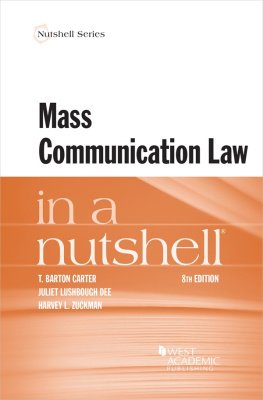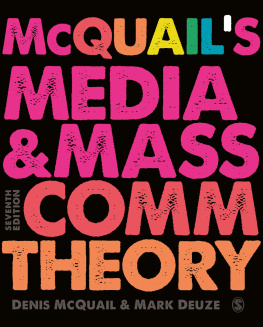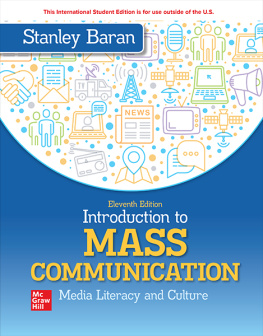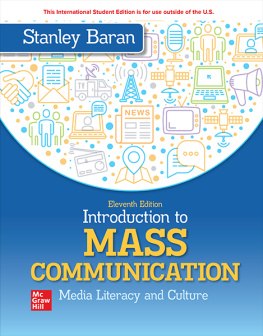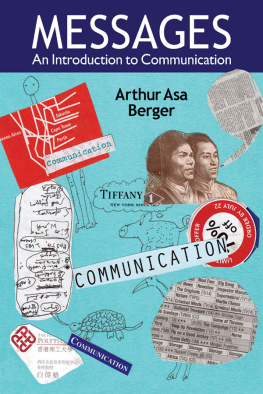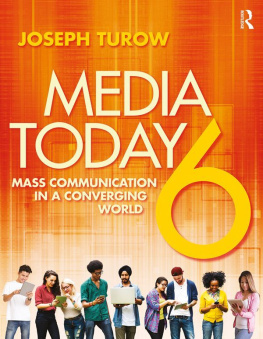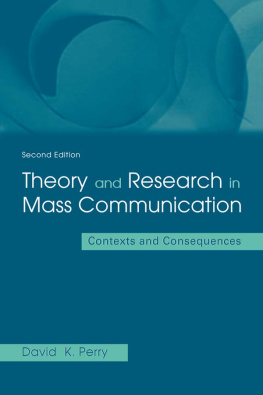West Academic Publishings Law School Advisory Board
Jesse H. Choper
Professor of Law and Dean Emeritus
University of California, Berkeley
Joshua Dressler
Distinguished University Professor Emeritus
Michael E. Moritz College of Law, The Ohio State University
RENE M c DONALD HUTCHINS
Dean and Joseph L. Rauh, Jr. Chair of Public Interest Law
University of the District of Columbia David A. Clarke School of Law
Yale Kamisar
Professor of Law Emeritus, University of San Diego
Professor of Law Emeritus, University of Michigan
Mary Kay Kane
Professor of Law, Chancellor and Dean Emeritus
University of California, Hastings College of the Law
Larry D. Kramer
President, William and Flora Hewlett Foundation
Jonathan R. Macey
Professor of Law, Yale Law School
DEBORAH JONES MERRITT
Distinguished University Professor, John Deaver Drinko/Baker &
Hostetler Chair in Law
Michael E. Moritz College of Law, The Ohio State University
Arthur R. Miller
University Professor, New York University
Formerly Bruce Bromley Professor of Law, Harvard University
Grant S. Nelson
Professor of Law Emeritus, Pepperdine University
Professor of Law Emeritus, University of California, Los Angeles
A. Benjamin Spencer
Justice Thurgood Marshall Distinguished Professor of Law
University of Virginia School of Law
James J. White
Robert A. Sullivan Professor of Law Emeritus
University of Michigan
Mass Communication Law
In a nutshell
Eighth Edition
T. BARTON CARTER
Professor
College of Communication
Boston University
JULIET LUSHBOUGH DEE
Associate Professor of Communication
College of Arts and Science
University of Delaware
HARVEY L. ZUCKMAN
Emeritus Professor of Law
The Catholic University of America
Founding Director
Institute for Communications Law Studies
Washington, D.C.

The publisher is not engaged in rendering legal or other professional advice, and this publication is not a substitute for the advice of an attorney. If you require legal or other expert advice, you should seek the services of a competent attorney or other professional.
Nutshell Series, In a Nutshell and the Nutshell Logo are trademarks registered in the U.S. Patent and Trademark Office.
COPYRIGHT 1977, 1983, 1988, 1994 WEST PUBLISHING CO.
West, a Thomson business, 2000, 2007
2014 LEG, Inc. d/b/a West Academic
2020 LEG, Inc. d/b/a West Academic
444 Cedar Street, Suite 700
St. Paul, MN 55101
1-877-888-1330
West, West Academic Publishing, and West Academic are trademarks of West Publishing Corporation, used under license.
Printed in the United States of America
ISBN: 978-1-64020-405-8
For Miriam, Gregory, and Charlotte
Preface
To appreciate the interrelationship of law and mass communication, just check the news feed on your smart phone. Each day one is likely to find news of important court decisions, news of proposed legislation and news about the Presidents executive orders. Even the sports page may contain as much news about lawsuits between team owners, unions and players as about team performance. Starting in the 1960s, there has been a veritable explosion in media coverage of legal issues. The medias increasing influence resulted in more problems for them, especially in the areas of First Amendment protection and Federal Communications Commission regulation. With the emergence of the Internet and other new technologies, the legal questions multiplied, starting with deregulation and re-regulation.
In this book we attempt to meet a continuing need for a basic text in communication law, not only for law students but journalism and communication students as well.
We wish to acknowledge our heavy debt to the following individuals and organizations in the preparation of this text: Professor Thomas I. Emerson, whose many writings greatly influenced our thinking on First Amendment issues, and the editorial board of Law and Contemporary Problems for permitting us to reprint material from Professor Emersons article The Doctrine of Prior Restraint, appearing in a symposium on Obscenity and the Arts in Law and Contemporary Problems (Vol. 20, No. 4, Autumn, 1955), published by Duke University School of Law, Durham, North Carolina, copyright 1955, by Duke University; the late Dean William L. Prosser, founding author of the Handbook of the Law of Torts, whose works greatly shaped our thinking in Chapters II and III on the law of defamation and privacy; Professor Dan B. Dobbs, author of the Handbook of the Law of Remedies (now in its third edition), for his guidance on the law of damages in defamation actions; the late Professor Melville B. Nimmer, without whose brilliant thinking on the law of copyright infringement actions no rational discussion of those subjects could be presented; the editorial board of the Texas Law Review for permission to paraphrase portions of the article by Donna Murasky, Esquire, The Journalists Privilege: Branzburg and Its Aftermath, 52 Texas Law Review 829 (1974) ; the editorial board of the Washington Law Review for permission to paraphrase portions of the article by Professors Don R. Pember and Dwight L. Teeter, Jr., Privacy and the Press Since Time, Inc. v. Hill, 50 Washington Law Review 57 (1974) ; Charles B. Blackmar, distinguished jurist and former teaching colleague and cherished friend of Professor Zuckman, for his insights into First Amendment problems engendered by lawyer advertising (he argued and won In re R.M.J. in the United States Supreme Court). We would also like to thank Research Assistant Kate Davis at Boston University and Senior Strategic Operations Editor Austin Mac Soto, Lead Publication Specialist Laura Holle and Editor Moriah Hamstad at West Academic Publishing for their patience and attention to detail. We are also grateful to West Academic Publishing for its computerized storage and retrieval system that made the progression from galley to page proof to publication so much easier for the authors and helped keep typographical errors to a minimum.
T. Barton Carter
Juliet L. Dee
Harvey Zuckman
November 2019
Outline
B. Background, Theories and Direction of the
First Amendment
Theories and Tests of the First
Amendment
b. Use of a Permanent Injunction to
Restrain Defamatory Speech
(2) General Requirements of the
Privilege
Section 230 of the Communications
Decency Act
The Public Figure-Private Person
Distinction
Specific Problems for the Media Created
by Gertz
Non-Media Defendants and Matters of
Public Concern
B. History and Development of the Common
Law
(3) Celebrity Look-Alikes and
Sound-Alikes
b. Applicability of First Amendment
Theory to Appropriation Cases
c. Federal Cases Involving Hidden
Cameras and Microphones
e. State Statutes on Participant
Recording
i. Applicability of First Amendment
Theory to Intrusion
b. Applicability of First Amendment
Theory to False Light Cases
c. Applicability of First Amendment
Theory to Public Disclosure of Private Facts
(1) Public Disclosure of Private Facts
in Cases Involving Sexual
Assault
(2) Public Disclosure of Private Facts
in Cases Involving Rehabilitated
Ex-Convicts
Common Characteristics of the Four
Types of Invasion of Privacy
D. Legislation Designed to Protect Personal
Privacy
Family Educational Rights and Privacy

